落花生 张培基译文 The Peanut
- 格式:docx
- 大小:15.83 KB
- 文档页数:3
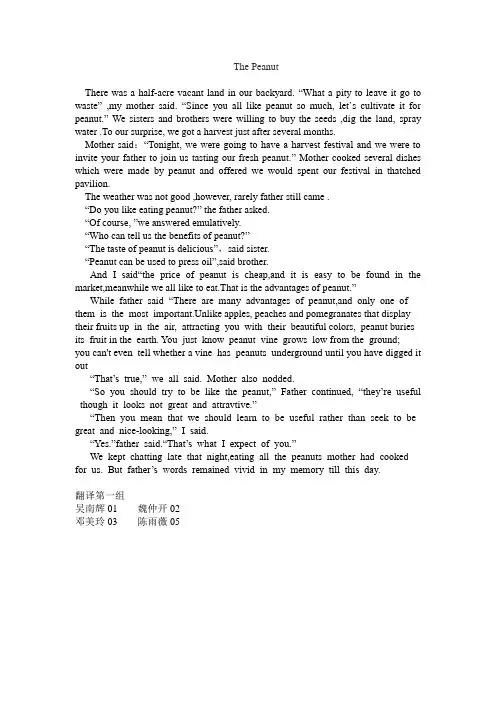
The PeanutThere was a half-acre vacant land in our backyard. “What a pity to leave it go to waste”,my mother said. “Since you all like peanut so much, let`s cultivate it for peanut.”We sisters and brothers were willing to buy the seeds ,dig the land, spray water .To our surprise, we got a harvest just after several months.Mother said:“Tonight, we were going to have a harvest festival and we were to invite your father to join us tasting our fresh peanut.” Mother cooked several dishes which were made by peanut and offered we would spent our festival in thatched pavilion.The weather was not good ,however, rarely father still came .“Do you like eating peanut?” the father asked.“Of course, ”we answered emulatively.“Who can tell us the benefits of peanut?”“The taste of peanut is delicious”,said sister.“Peanut can be used to press oil”,said brother.And I said“the price of peanut is cheap,and it is easy to be found in the market,meanwhile we all like to eat.That is the advantages of peanut.”While father said “There are many advantages of peanut,and only one of them is the most important.Unlike apples, peaches and pomegranates that display their fruits up in the air, attracting you with their beautiful colors, peanut buries its fruit in the earth. You just know peanut vine grows low from the ground; you can't even tell whether a vine has peanuts underground until you have digged it out“That’s true,” we all said. Mother also nodded.“So you should try to be like the peanut,” Father continued, “they’re useful though it looks not great and attravtive.”“Then you mean that we should learn to be useful rather than seek to be great and nice-looking,” I said.“Yes.”father said.“That’s what I expect of you.”We kept chatting late that night,eating all the peanuts mother had cooked for us. But f ather’s words remained vivid in my memory till this day.翻译第一组吴南辉01 魏仲开02邓美玲03 陈雨薇05。
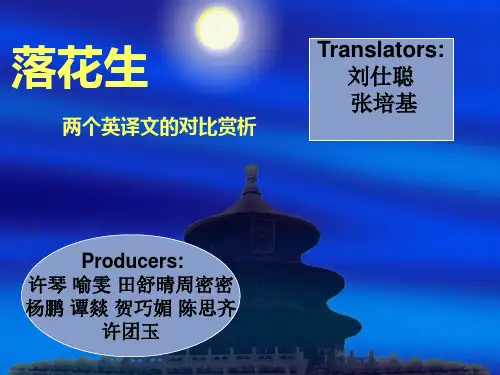
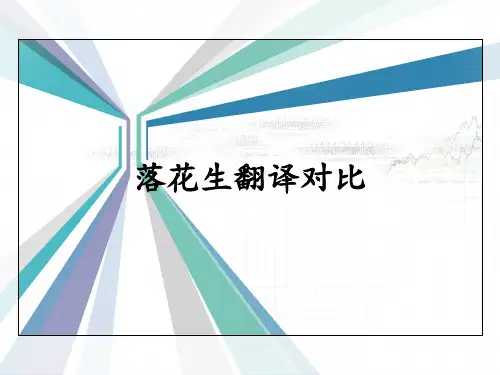
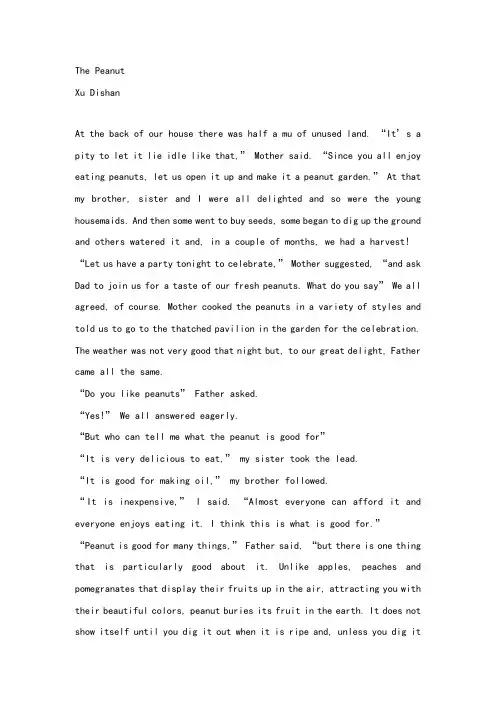
The PeanutXu DishanAt the back of our house there was half a mu of unused land. “It’s a pity to let it lie idle like that,” Mother said. “Since you all enjoy eating peanuts, let us open it up and make it a peanut garden.” At that my brother, sister and I were all delighted and so were the young housemaids. And then some went to buy seeds, some began to dig up the ground and others watered it and, in a couple of months, we had a harvest!“Let us have a party tonight to celebrate,” Mother suggested, “and a sk Dad to join us for a taste of our fresh peanuts. What do you say” We all agreed, of course. Mother cooked the peanuts in a variety of styles and told us to go to the thatched pavilion in the garden for the celebration. The weather was not very good that night but, to our great delight, Father came all the same.“Do you like peanuts” Father asked.“Yes!” We all answered eagerly.“But who can tell me what the peanut is good for”“It is very delicious to eat,” my sister took the lead.“It is good for making oil,” my brother followed.“It is inexpensive,” I said. “Almost everyone can afford it and everyone enjoys eating it. I think this is what is good for.”“Peanut is good for many things,” Father said, “but there is one thing that is particularly good about it. Unlike apples, peaches and pomegranates that display their fruits up in the air, attracting you with their beautiful colors, peanut buries its fruit in the earth. It does not show itself until you dig it out when it is ripe and, unless you dig itout, you can’t tell it bears fruit or not just by its frail stem quivering above ground.”“That’s true,” we all said and Mother nodded her assent, too. “So you should try to be like the peanut,” Father went on, “because it is useful, though not great or attrac tive.”“Do you mean,” I asked, “we should learn to be useful but not seek to be great or attractive”“Yes,” Father said. “This is what I expect of you.”We stayed up late that night, eating all the peanuts Mother had cooked for us. But father’s words remai ned vivid in my memory till this day.(刘世聪译)PeanutsXu DishanBehind our house there lay half a mou vacant land. Mother said: “It’s a pity to let it lie waste. Since you all like to eat peanuts so very much, why not plant some here” That exhilarated us children and our servant girls as well, and soon we started buying seeds, ploughing the land and watering the plants. We gathered in a good harvest just after a couple of months!Mother said, “How about giving a party this evening to celebrate the harvest and inviting your Daddy to have a taste of our newly-harvested peanuts” We all agreed. Mother made quite a few varieties of goodies out of the peanuts, and told us that the party would be held in the thatchedpavilion on the peanut plot.It looked like rain that evening, yet, to our great joy, father came nevertheless.”Do you like peanuts” asked father.“Yes, we do!”we vied in giving the answer.“Which of you could name the good things in peanuts”“Peanuts taste good,” said my elder sister.“Peanuts prod uce edible oil,” said my elder sister.“Peanuts are so cheap,” said I, “that anyone can afford to eat them. Peanuts are everyone’s favourite. That’s why we call peanuts good.”“It’s true that peanuts have many uses,” said father, “but they’re most beloved in one respect. Unlike nice-looking apples, peaches, and pomegranates, which hang their fruit on branches and win people’s admiration with their brilliant colours, tiny little peanuts bury themselves underground and remain unearthed until they’re ripe. Whe n you come upon a peanut plant lying curled up on the ground, you can never immediately tell whether or not it bears any nuts until you touch them.”“That’s true,” we said in unison. Mother also nodded. “So you must take after peanuts,” father continued, “because they’re useful though not great and nice-looking.”“Then you mean one should be useful rather than great and nice-looking,”I said.“That’s what I expect of you,” father concluded.We kept chatting until the party broke up late at night. Today, though nothing is left of the goodies made of peanuts, father’s words remain engraved in my mind.(张培基译)。
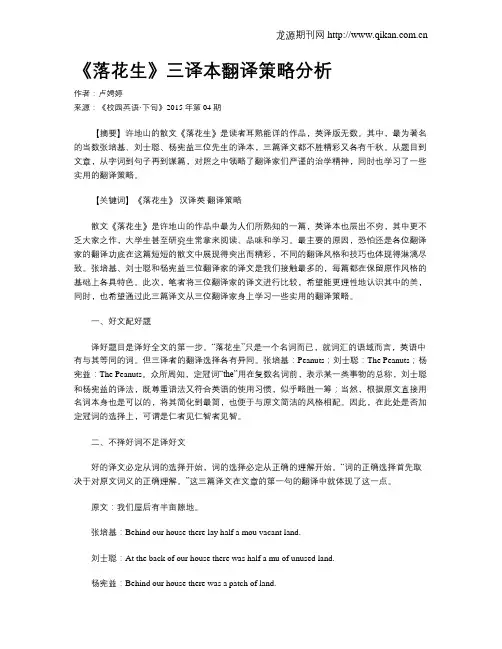
《落花生》三译本翻译策略分析作者:卢娉婷来源:《校园英语·下旬》2015年第04期【摘要】许地山的散文《落花生》是读者耳熟能详的作品,英译版无数。
其中,最为著名的当数张培基、刘士聪、杨宪益三位先生的译本,三篇译文都不胜精彩又各有千秋。
从题目到文章,从字词到句子再到谋篇,对照之中领略了翻译家们严谨的治学精神,同时也学习了一些实用的翻译策略。
【关键词】《落花生》汉译英翻译策略散文《落花生》是许地山的作品中最为人们所熟知的一篇,英译本也层出不穷,其中更不乏大家之作,大学生甚至研究生常拿来阅读、品味和学习。
最主要的原因,恐怕还是各位翻译家的翻译功底在这篇短短的散文中展现得突出而精彩,不同的翻译风格和技巧也体现得淋漓尽致。
张培基、刘士聪和杨宪益三位翻译家的译文是我们接触最多的,每篇都在保留原作风格的基础上各具特色。
此次,笔者将三位翻译家的译文进行比较,希望能更理性地认识其中的美,同时,也希望通过此三篇译文从三位翻译家身上学习一些实用的翻译策略。
一、好文配好题译好题目是译好全文的第一步。
“落花生”只是一个名词而已,就词汇的语域而言,英语中有与其等同的词。
但三译者的翻译选择各有异同。
张培基:Peanuts;刘士聪:The Peanuts;杨宪益:The Peanuts。
众所周知,定冠词“the”用在复数名词前,表示某一类事物的总称,刘士聪和杨宪益的译法,既尊重语法又符合英语的使用习惯,似乎略胜一筹;当然,根据原文直接用名词本身也是可以的,将其简化到最简,也便于与原文简洁的风格相配。
因此,在此处是否加定冠词的选择上,可谓是仁者见仁智者见智。
二、不择好词不足译好文好的译文必定从词的选择开始,词的选择必定从正确的理解开始。
“词的正确选择首先取决于对原文词义的正确理解。
”这三篇译文在文章的第一句的翻译中就体现了这一点。
原文:我们屋后有半亩隙地。
张培基:Behind our house there lay half a mou vacant land.刘士聪:At the back of our house there was half a mu of unused land.杨宪益:Behind our house there was a patch of land.除了刘士聪先生用的是“at the back of ”之外,其它两位翻译家都是用的“behind”。
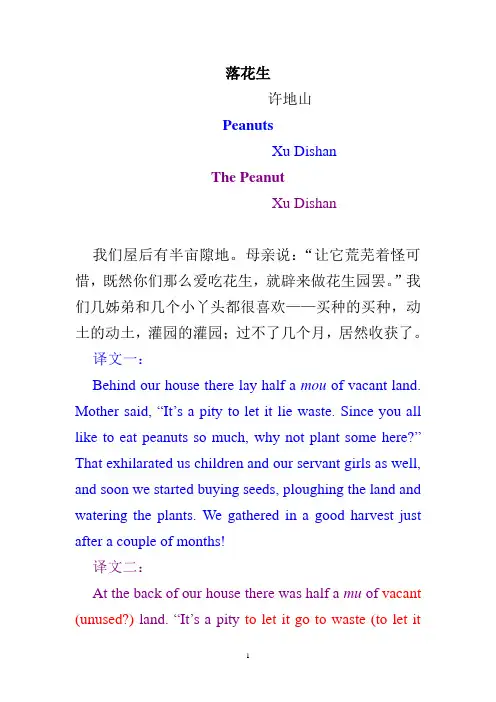
落花生许地山PeanutsXu DishanThe PeanutXu Dishan我们屋后有半亩隙地。
母亲说:“让它荒芜着怪可惜,既然你们那么爱吃花生,就辟来做花生园罢。
”我们几姊弟和几个小丫头都很喜欢——买种的买种,动土的动土,灌园的灌园;过不了几个月,居然收获了。
译文一:Behind our house there lay half a mou of vacant land. Mother said, “It’s a pity to let it lie waste. Since you all like to eat peanuts so much, why not plant some here?”That exhilarated us children and our servant girls as well, and soon we started buying seeds, ploughing the land and watering the plants. We gathered in a good harvest just after a couple of months!译文二:At the back of our house there was half a mu of vacant (unused?) land. “It’s a pity to let it go to waste (to let itlie waste?) like that,” Mother said. “Since you all enjoy eating peanuts, let us open it up and make it a peanut garden.”At that my brother, sister and I were all delighted and so were the young housemaids. Some went to (And then some went to?)buy seeds, some dug the ground (some began to dig the ground?) and others watered it and, in a couple of months, we had a harvest!妈妈说:“今晚我们可以做一个收获节,也请你们爹爹来尝尝我们底新花生,如何?”我们都答应了。
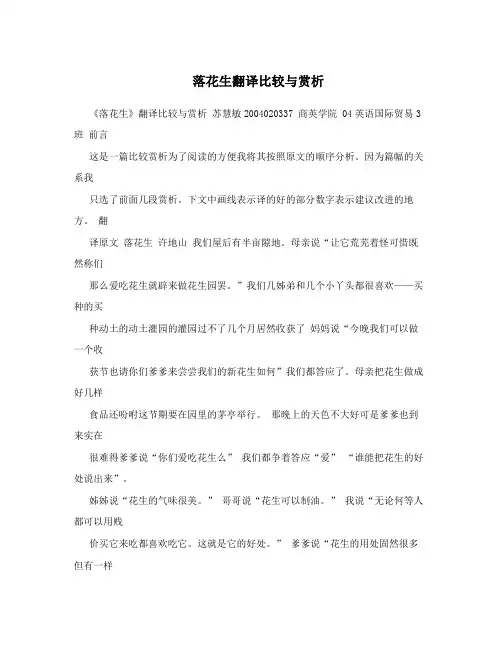
落花生翻译比较与赏析《落花生》翻译比较与赏析苏慧敏2004020337 商英学院 04英语国际贸易3班前言这是一篇比较赏析为了阅读的方便我将其按照原文的顺序分析。
因为篇幅的关系我只选了前面几段赏析。
下文中画线表示译的好的部分数字表示建议改进的地方。
翻译原文落花生许地山我们屋后有半亩隙地。
母亲说“让它荒芜着怪可惜既然称们那么爱吃花生就辟来做花生园罢。
”我们几姊弟和几个小丫头都很喜欢——买种的买种动土的动土灌园的灌园过不了几个月居然收获了妈妈说“今晚我们可以做一个收获节也请你们爹爹来尝尝我们的新花生如何”我们都答应了。
母亲把花生做成好几样食品还吩咐这节期要在园里的茅亭举行。
那晚上的天色不大好可是爹爹也到来实在很难得爹爹说“你们爱吃花生么” 我们都争着答应“爱” “谁能把花生的好处说出来”。
姊姊说“花生的气味很美。
” 哥哥说“花生可以制油。
” 我说“无论何等人都可以用贱价买它来吃都喜欢吃它。
这就是它的好处。
” 爹爹说“花生的用处固然很多但有一样是很可贵的。
这小小的豆不像那好看的苹果、桃子、石榴把它们的果实悬在枝上鲜红嫩绿的颜色令人一望而发生羡慕的心。
它只把果子埋在地的等到成熟才容人把它挖出来。
你们偶然看见一棵花生瑟缩地长在地上不能立刻辨出它有没有果实非得等到你接触它才能知道。
” 我们都说“是的。
”母亲也点点头。
爹爹接下去说“所以你们要像花生因为它是有用的不是伟大、好看的东西。
”我说“那么人要做有用的人不要做伟大、体面的人了。
”爹爹说“这是我对于你们的希望。
” 我们谈到夜阑才散所有花生食品虽然没有了然而父亲的话现在还印在我心版上。
本文是1892-1941的一篇久为流传的散文。
作者回忆自己童年时代的一个小小片段以朴实无华、清新自然的笔调从花生的平凡而有用谈到做人的道理富于哲理反映他身处旧社会的污泥浊流而洁身自好、不慕虚名的思想境界。
标题落花生刘士聪先生下称”刘”译The Peanut 张培基先生下称”张”译: Peanuts 分析The Peanut 让人联想到花生的种类。
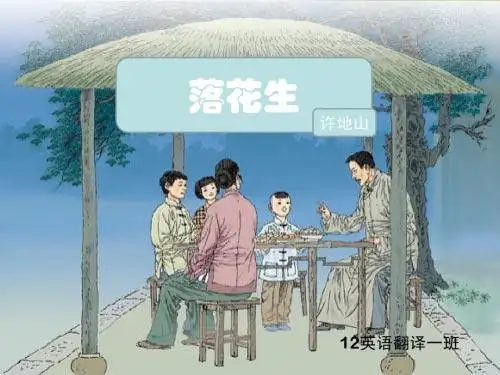
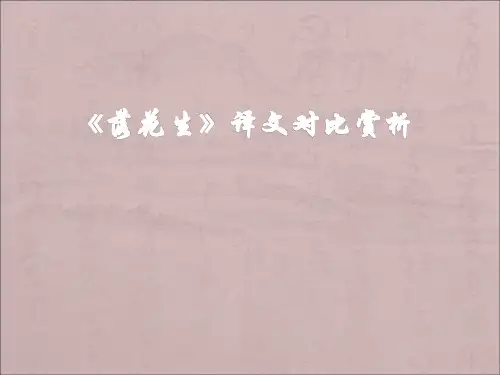
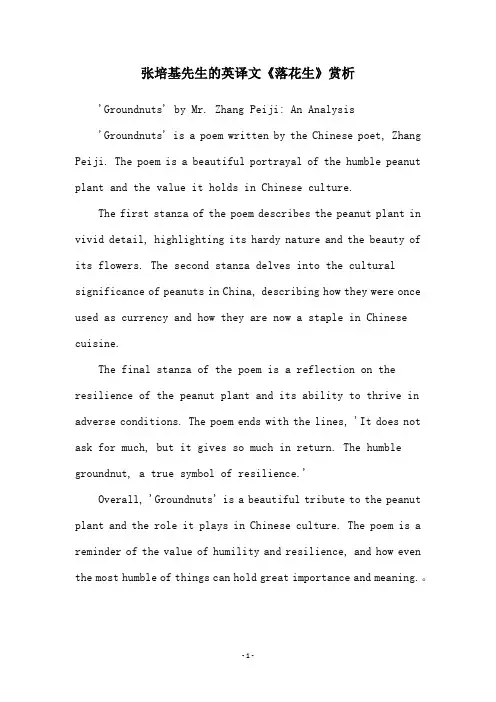
张培基先生的英译文《落花生》赏析'Groundnuts' by Mr. Zhang Peiji: An Analysis'Groundnuts' is a poem written by the Chinese poet, Zhang Peiji. The poem is a beautiful portrayal of the humble peanut plant and the value it holds in Chinese culture.The first stanza of the poem describes the peanut plant in vivid detail, highlighting its hardy nature and the beauty of its flowers. The second stanza delves into the cultural significance of peanuts in China, describing how they were once used as currency and how they are now a staple in Chinese cuisine.The final stanza of the poem is a reflection on the resilience of the peanut plant and its ability to thrive in adverse conditions. The poem ends with the lines, 'It does not ask for much, but it gives so much in return. The humble groundnut, a true symbol of resilience.'Overall, 'Groundnuts' is a beautiful tribute to the peanut plant and the role it plays in Chinese culture. The poem is a reminder of the value of humility and resilience, and how even the most humble of things can hold great importance and meaning.。
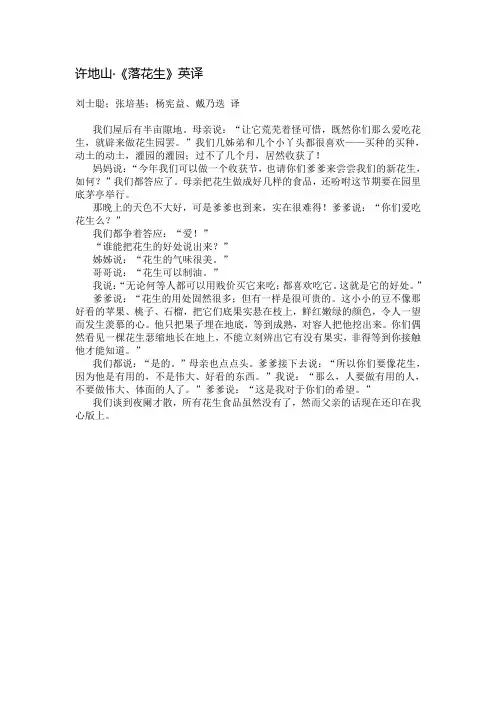
许地山·《落花生》英译刘士聪;张培基;杨宪益、戴乃迭译我们屋后有半亩隙地。
母亲说:“让它荒芜着怪可惜,既然你们那么爱吃花生,就辟来做花生园罢。
”我们几姊弟和几个小丫头都很喜欢——买种的买种,动土的动土,灌园的灌园;过不了几个月,居然收获了!妈妈说:“今年我们可以做一个收获节,也请你们爹爹来尝尝我们的新花生,如何?”我们都答应了。
母亲把花生做成好几样的食品,还吩咐这节期要在园里底茅亭举行。
那晚上的天色不大好,可是爹爹也到来,实在很难得!爹爹说:“你们爱吃花生么?”我们都争着答应:“爱!”“谁能把花生的好处说出来?”姊姊说:“花生的气味很美。
”哥哥说:“花生可以制油。
”我说:“无论何等人都可以用贱价买它来吃;都喜欢吃它。
这就是它的好处。
”爹爹说:“花生的用处固然很多;但有一样是很可贵的。
这小小的豆不像那好看的苹果、桃子、石榴,把它们底果实悬在枝上,鲜红嫩绿的颜色,令人一望而发生羡慕的心。
他只把果子埋在地底,等到成熟,对容人把他挖出来。
你们偶然看见一棵花生瑟缩地长在地上,不能立刻辨出它有没有果实,非得等到你接触他才能知道。
”我们都说:“是的。
”母亲也点点头。
爹爹接下去说:“所以你们要像花生,因为他是有用的,不是伟大、好看的东西。
”我说:“那么,人要做有用的人,不要做伟大、体面的人了。
”爹爹说:“这是我对于你们的希望。
”我们谈到夜阑才散,所有花生食品虽然没有了,然而父亲的话现在还印在我心版上。
The PeanutXu DishanAt the back of our house there was half a mu of unused land. “It’s a pity to let it lie idle like that,” Mother said.“Since you all enjoy eating peanuts, let us open it up and make it a peanut garden.” At that my brother, sister and I were all delighted and so were the young housemaids. And then some went to buy seeds, some began to dig up the ground and others watered it and, in a couple of months, we had a harvest!“Let us have a party tonight to celebrate,” Mother suggested, “and ask Dad to join us for a taste of our fresh peanuts. What do you say?” We all agreed, of course. Mother cooked the peanuts in a variety of styles and told us to go to the thatched pavilion in the garden for the celebration.The weather was not very good that night but, to our great delight, Father came all the same.“Do you like peanuts?” Father asked.“Yes!” We all answered eagerly.“But who can tell me what the peanut is good for?”“It is very delicious to eat,” my sister took the lead.“It is good for making oil,” my brother followed.“It is inexpensive,” I said. “Almost everyone can afford it and everyone enjoys eating it. I think this is w hat is good for.”“Peanut is good for many things,” Father said, “but there is one thing that is particularly good about it. Unlike apples, peaches and pomegranates that display their fruits up in the air, attracting you with their beautiful colors, peanut buries its fruit in the earth. It does not show itself until you dig it out when it is ripe and, unless you dig it out, you can’t tell it bears fruit or not just by its frail stem quivering above ground.”“That’s true,” we all said and Mother nodded her assent, too. “So you should try to be like the peanut,” Father went on, “because it is useful, though not great or attractive.”“Do you mean,” I asked, “we should learn to be useful but not seek to be great or attractive?”“Yes,” Father said. “This is what I expect of you.”We stayed up late that night, eating all the peanuts Mother had cooked for us. But father’s words remained vivid in my memory till this day.(刘世聪译)PeanutsXu DishanBehind our house there lay half a mou vacant land. Mother said: “It’s a pity to let it lie waste. Since you all like to eat peanuts so very much, why not plant some here?” That exhilarated us children and our servant girls as well, and soon we started buying seeds, ploughing the land and watering the plants. We gathered in a good harvest just after a couple of months!Mother said, “How about giving a party this evening to celebrate the harvest and inviting your Daddy to have a taste of our newly-harvested peanuts?” We all agreed. Mother made quite a few varieties of goodies out of the peanuts, and told us that the party would be held in the thatched pavilion on the peanut plot.It looked like rain that evening, yet, to our great joy, father came nevertheless.”Do you like peanuts?” asked father.“Yes, we do!”we vied in giving the answer.“Which of you could name the good things in peanuts?”“Peanuts taste good,” said my elder sister.“Peanuts produce edible oil,” said my elder sist er.“Peanuts are so cheap,” said I, “that anyone can afford to eat them. Peanuts are everyone’s favourite. That’s why we call peanuts good.”“It’s true that peanuts have many uses,” said father, “but they’re most beloved in one respect. Unlike nice-looking apples, peaches, and pomegranates, which hang their fruit on branches and win people’s admiration with their brilliant colours, tiny little peanuts bury themselves underground and remain unearthed until they’re ripe. When you come upon a peanut plant lying curled up on the ground, you can never immediately tell whether or not it bears any nuts until you touch them.”“That’s true,” we said in unison. Mother also nodded. “So you must take after peanuts,” father continued, “because they’re useful though not g reat andnice-looking.”“Then you mean one should be useful rather than great and nice-looking,” I said.“That’s what I expect of you,” father concluded.We kept chatting until the party broke up late at night. Today, though nothing is left of the goodies made of peanuts, father’s words remain engraved in my mind.(张培基译)The PeanutXu DishanBehind our house there was a patch of land. “It would be a pity to let it go wild,” said Mother. “I suggest that since you are all so fond of peanuts you should grow some there.”We children and the little maidservants were all delighted. Some of us bought seeds, some dug up the plot and others watered it. In just a few months we had a harvest.Mother said, “Let’s have a harvest festival tonight and invite your father to taste our fresh peanuts.”We all agreed. Mother made a variety of dishes using our peanuts and instructed that the festival should be held in the thatched pavilion in the garden.The weather was not very good that evening, but even Father put in an appearance, which was a rare event.“Do you all like peanuts?” asked Father.“Yes!” we all clamoured to reply.“Who can tell me what’s good about peanuts?”“They taste good,” said older sister.“They can be made into oil,” said older brother.“Everybody can afford to buy them, whoever they m ight be, and everyone likes them. That’s what’s good about peanuts,” said I.Father said, “In fact the peanut has many uses, but the most valuable thing about this little nut is this: it’s not like the apple, peach or pomegranate, flaunting their bright, beautiful fruits on their branches for all to see and admire. The peanut lies buried in the soil, waiting until it is ripe before letting people dig it up. If ever you come across a shy peanut plant you cannot immediately tell whether or not it has any nuts. You have to find them to be certain.”We all agreed with this and Mother nodded her head too. Father continued, “So you should all try to be like the peanut, because it is neither grand nor beautiful, but useful.”“Does that mean that people should try to be useful rather than famous or great?”I asked.“That is what I hope of you all,” Father replied.We talked late into the night before dispersing. Although we ate all the peanuts that evening, Father’s words still remain embedded in my mind.(杨宪益、戴乃迭译)。
落花生三篇译文赏析标题:落花生译文一:Peanuts译文二:The Peanut译文三:The Peanut赏析:the+单数名词:以个别别的、具体的实务来象征一些相关的综合的抽象事物。
结合语境:“爹爹接下去说:‘所以你们要像花生,’‘要做有用的人。
’”文章主要是赞扬花生这一物种的优良品格,The Peanut象征落花生的精神,所以The Peanut比Peanuts要好。
选段一:我们屋后有半亩隙地。
母亲说,“让它荒芜着怪可惜,既然你们那么爱吃花生,就辟来做花生园罢。
”我们几姊弟和几个小丫头都很喜欢——买种的买种,动土的动土,灌园的灌园;过不了几个月,居然收获了!译文一:Behind our house there lay half a mu of vacant land. Mother said, "It's a pity to let it lie waste. Since you all like to eat peanuts so much, why not have them planted here. “That exhilarated us children and our se rvant girls as well, and soon we started buying seeds, ploughing the land and watering the plants . We gathered in a good harvest just after a couple of months!译文二:At the back of our house there was half a mu of vacant land. "It’s a pity to let it go to w aste like that,” Mother said. "Since you all enjoy eating peanuts, let us open it up and make it a peanut garden." At that my brother, sister and I were all delighted and so were the young housemaids. Some went to buy seeds, some dug the ground and others watered it and, in a couple of months, we had a harvest!译文三:Behind our house there was a patch of land. "It would be a pity to let it go wild.” said Mother. “I suggest that since you are all so fond of peanuts you should grow some there.”We children and the little maidservants were all delighted. Some of us bought seeds, some dug up the plot and others watered it. In just a few months we had a harvest.赏析:“屋后”从逻辑上讲应该是房子的“后面”Behind,而不是房间的“后部”At the back of。
《落花生》翻译比较与赏析《落花生》是许地山(1893-1941)的散文作品之一,在这篇文章中,作者用朴实有力的文字,从花生的平凡而有用谈到了做人的哲学道理。
下面对刘士聪、张培基和杨宪益三位大家的译文稍作赏析:1.首先就文章题目“落花生”来说,“落花生”只是花生的一种别名,有“Peanuts”和“The Peanut”两种译法,Peanuts或许能够让我们联想到摆放在桌上的一碟花生,而“The Peanut”不仅能让人联想到花生的果实,还能让人想到花生的茎、叶等,所以“The Peanut”更适合做标题。
2.“半亩隙地”:在英文中没有“亩”的概念,相比较来说,像刘和张那样直译成“mu”,杨译的“a patch of land”在表达上更加地道、直观。
3.文章第一句话“我们屋后有半亩隙地。
”,刘译的“At the back of…”是表示在某个空间范围内的后面,例如:教室的后面放着几把伞。
(伞是在教室里面的),所以刘的表达有误。
此外,可以在母亲说之前加上“One day”,这样就不会那么突兀了。
4.“荒芜”:刘译的“let it lie idle”、张译的“let it lie waste”和杨译的“let it go wild”在结构上没什么大的区别,只是idle可能比waste更好。
5.“我们几姊弟,几个小丫头”:杨译的“we children”和刘译的“my brother,sister and I”相比较,前者更加简洁,而后者比较累赘。
在文章和作者的背景之下,这里是指作者家的仆人,三种译法“the young housemaid”, “servant girls”和“little maidservants”都是可以的。
6.“居然”可以看出作者的一种喜悦、惊讶的情感,在张和杨均用了“just”一词来表达。
7.“做一个收获节”,“如何”:妈妈提出要庆祝花生的收获,是一种建议,3个译文中,张译的“How about…”是比较可取的,但张用的“giving a party”是指邀请很多人参加的大型聚会,而文中是指小型的家庭聚会,所以是不恰当的。
《落花生》翻译比较与赏析苏慧敏2004020337 商英学院04英语(国际贸易)3班前言:这是一篇比较赏析,为了阅读的方便,我将其按照原文的顺序分析。
因为篇幅的关系,我只选了前面几段赏析。
下文中画线表示译的好的部分,数字表示建议改进的地方。
翻译原文:落花生许地山我们屋后有半亩隙地。
母亲说:“让它荒芜着怪可惜,既然称们那么爱吃花生,就辟来做花生园罢。
”我们几姊弟和几个小丫头都很喜欢——买种的买种,动土的动土,灌园的灌园;过不了几个月,居然收获了!妈妈说:“今晚我们可以做一个收获节,也请你们爹爹来尝尝我们的新花生,如何?”我们都答应了。
母亲把花生做成好几样食品,还吩咐这节期要在园里的茅亭举行。
那晚上的天色不大好,可是爹爹也到来,实在很难得!爹爹说:“你们爱吃花生么?”我们都争着答应:“爱!”“谁能把花生的好处说出来?”。
姊姊说:“花生的气味很美。
”哥哥说:“花生可以制油。
”我说:“无论何等人都可以用贱价买它来吃;都喜欢吃它。
这就是它的好处。
”爹爹说:“花生的用处固然很多;但有一样是很可贵的。
这小小的豆不像那好看的苹果、桃子、石榴,把它们的果实悬在枝上,鲜红嫩绿的颜色,令人一望而发生羡慕的心。
它只把果子埋在地的,等到成熟,才容人把它挖出来。
你们偶然看见一棵花生瑟缩地长在地上,不能立刻辨出它有没有果实,非得等到你接触它才能知道。
”我们都说:“是的。
”母亲也点点头。
爹爹接下去说:“所以你们要像花生,因为它是有用的,不是伟大、好看的东西。
”我说:“那么,人要做有用的人,不要做伟大、体面的人了。
”爹爹说:“这是我对于你们的希望。
”我们谈到夜阑才散,所有花生食品虽然没有了,然而父亲的话现在还印在我心版上。
本文是(1892-1941)的一篇久为流传的散文。
作者回忆自己童年时代的一个小小片段,以朴实无华、清新自然的笔调,从花生的平凡而有用,谈到做人的道理,富于哲理,反映他身处旧社会的污泥浊流而洁身自好、不慕虚名的思想境界。
《落花生》英译文对比赏析-精品文档(精品文档)《落花生》英译文对比赏析【】The paper will compare and appreciate the two English versions―Peanuts written by Xu Dishan from the perspective of aesthetic process. The article will specifically appreciate these two English versions from these following three processes:cognition, process and reproduction. The translation of prose needs consideration of aesthetics and only in this way can the translators achieve an excellent likeness with the original text.一、关于落花生《落花生》是现代散文家许地山先生的杰作,发表于20世纪20年代,正是由于其“质朴淳厚、意境深远”,而被誉为现代散文的经典。
《落花生》一文主要追忆作者年幼时,父亲以花生为榜样,来告诫子女做人真理。
父亲的话对作者一生影响深远。
这篇散文以叙事的方式,进行了独具匠心的表达,语言平实、简明精当,但意趣深远,寓理于物。
本文从翻译美学理论之翻译审美过程来对《落花生》两个英译本进行对比赏析,分别为张培基先生译本(以下简称“张译”),刘士聪先生译本(以下简称“刘译”),来领略散文英译的妙处。
二、关于翻译美学之翻译审美过程1.认识。
要想成功地传译原文所具备的美学信息,须对源语有深刻、彻底地认识。
而这种认识既包括原文语言结构美,也包括风格、意境和文化内涵之美。
总之,译文一定要与原文达到“神似”的境界。
落花生赏析原文:我们屋后有半亩隙地。
母亲说:“让它荒芜着怪可惜,既然你们那么爱吃花生,就辟来做花生园罢。
”我们几姊弟和几个小丫头都很喜欢——买种的买种,动土的动土,灌园的灌园;过不了几个月,居然收获了!《落花生》许地山译文1(张培基):Behind our house there lay half a mou vacant land. Mother said: “It’s a pity to let it lie waste. Since you all like to eat peanuts so very much, why not plant some here?” That exhilarated us children and our servant girls as well, and soon we started buying seeds, ploughing the land and watering the plants. We gathered in a good harvest just after a couple of months!Peanuts Xu Dishan译文2(刘士聪):At the back of our house there was half a mu of unused land. “It’s a pity to let it lie idle like that,” Mother said. “Since you all enjoy eating peanuts, let us open it up and make it a peanut garden.” At that my brother, sister and I were all delighted and so were the young housemaids.And then some went to buy seeds, some began to dig up the ground and others watered it and, in a couple of months, we had a harvest!Peanuts Xu Dishan译文3(中国文学出版社编):Behind our house there was a patch of land. “It would be a pity to let it go wild”said Mother.“I suggest that since you are all so fond of peanuts you should grow some there.”We children and the little maidservants were all delighted. Some of us bought seeds, some dug up the plot and others watered it. In just a few months we had a harvest.赏析:散文是一种多以描写真实事件为基础的能够抒发个人感情的文章,在结构上注重层次,往往以生动简洁来打动读者的心扉。
The Peanut
Xu Dishan
At the back of our house there was half a mu of unused land. “It’s a pity to let it lie idle like that,” Mother said. “Since you all enjoy eating peanuts, let us open it up and make it a peanut garden.” At that my brother, sister and I were all delighted and so were the young housemaids. And then some went to buy seeds, some began to dig up the ground and others watered it and, in a couple of months, we had a harvest! “Let us have a party tonight to celebrate,” Mother suggested, “and ask Dad to join us for a taste of our fresh peanuts. What do you say?” We all agreed, of course. Mother cooked the peanuts in a variety of styles and told us to go to the thatched pavilion in the garden for the celebration.
The weather was not very good that night but, to our great delight, Father came all the same.
“Do you like peanuts?” Father asked.
“Yes!” We all answered eagerly.
“But who can tell me what the peanut is good for?”
“It is very delicious to eat,” my sister took the lead.
“It is good for ma king oil,” my brother followed.
“It is inexpensive,” I said. “Almost everyone can afford it and everyone enjoys eating it. I think this is what is good for.”
“Peanut is good for many things,” Father said, “but there is one thing that is particularly good about it. Unlike apples, peaches and pomegranates that display their fruits up in the air, attracting you with their beautiful colors, peanut buries its fruit in the earth. It does not show itself until you dig it out when it is ripe and, unless you dig it out, you can’t tell it bears fruit or not just by its frail stem quivering above ground.”
“That’s true,” we all said and Mother nodded her assent, too. “So you should try to be like the peanut,” Father went on, “because it is useful, though not great or at tractive.”
“Do you mean,” I asked, “we should learn to be useful but not seek to be great or attractive?”
“Yes,” Father said. “This is what I expect of you.”
We stayed up late that night, eating all the peanuts Mother had cooked for us. But father’s words remained vivid in my memory till this day.
(刘世聪译)
Peanuts
Xu Dishan
Behind our house there lay half a mou vacant land. Mother said: “It’s a pity to let it lie waste. Since you all like to eat peanuts so very much, why not plant some here?” That exhilarated us children and our servant girls as well, and soon we started buying seeds, ploughing the land and watering the plants. We gathered in a good harvest just after a couple of months!
Mother said, “How about giving a party this evening to celebrate the harvest and inviting your Daddy to have a taste of our newly-harvested peanuts?” We all agreed. Mother made quite a few varieties of goodies out of the peanuts, and told us that the party would be held in the thatched pavilion on the peanut plot.
It looke d like rain that evening, yet, to our great joy, father came nevertheless.”Do you like peanuts?” asked father.
“Yes, we do!”we vied in giving the answer.
“Which of you could name the good things in peanuts?”
“Peanuts taste good,” said my elder sister.
“Peanuts produce edible oil,” said my elder sister.
“Peanuts are so cheap,” said I, “that anyone can afford to eat them. Peanuts are everyone’s favourite. That’s why we call peanuts good.”
“It’s true that peanuts have many uses,” said father, “but they’re m ost beloved in one respect. Unlike nice-looking apples, peaches, and pomegranates, which hang their fruit on branches and win people’s admiration with their brilliant colours, tiny little peanuts bury themselves underground and remain unearthed until they’re ripe. When you come upon a peanut plant lying curled up on the ground, you can never immediately tell whether or not it bears any nuts until you touch them.”
“That’s true,” we said in unison. Mother also nodded. “So you must take after peanuts,” father continued, “because they’re useful though not great and nice-looking.”
“Then you mean one should be useful rather than great and nice-looking,” I said.“That’s what I expect of you,” father concluded.
We kept chatting until the party broke up late at night. Today, though nothing is left of the goodies made of peanuts, father’s words remain engraved in my mind.
(张培基译)。